PUPPIES’ LOVE…
If you have any questions about property in Costa Rica, click here to contact our partner agent.click here to contact the listing agent.
Doing for others is one of the most reliable and well documented sources of happiness. I’ll bet you’ve often seen that in your own life, too. So my life plan includes volunteering at a few agencies here in the Costa Ballena. My longest service is with an animal rescue shelter where every time I help, some dogs make me happy just by being happy to see me. But as fortunate as I’ve been in experiencing happiness, and as much as I’ve studied the matter, I still have much to learn.
You might think that not very much of such learning would come from kids. After all, it’s our role to teach these apprentice humans about the habits, attitudes, and lifestyles that produce a good, happy life. But, I had to revise that assumption lately as I learned a lot about happy living from kids. I also discovered that a happiness lesson—even one well learned—can be forgotten and a happiness opportunity missed.
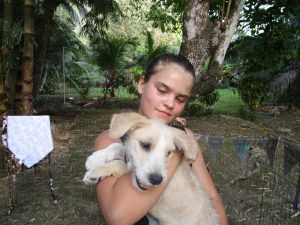
A little story will help me explain. Before a recent fundraiser for the shelter, I almost talked myself out of enjoying a guaranteed source of happiness; puppies! The morning of the event I considered canceling my participation. Oh, I had plenty of “good reasons;” my wife arrived late the night before, I was very tired, and it looked like rain. Besides, truth be told, I didn’t think many would show up for the activity. As cute as they are, how many adults would want to “Smooch Pooches” when they could be inside drinking and rocking out to local bands? Why bother? I thought. I expected to be sitting alone outside, listening to the bands from a distance.
I was wrong. Boy, was I wrong!
To my surprise, many of the fair’s attendees were parents and the puppy pen turned out to be a “babysitting service” for their kids. Most were little girls from age four to about fifteen, and all wanted to smooch those pooches, freeing their parents to enjoy adult beverages in the bar and grill. Throughout the afternoon, kids came and went, and some even settled in and spent the entire time with me and eight of God’s cutest creations. Little boys seemed less inclined to “mother” pups.
What could be a better source of short term happiness and a better opportunity to reflect on overall happiness than time with puppies and kids?
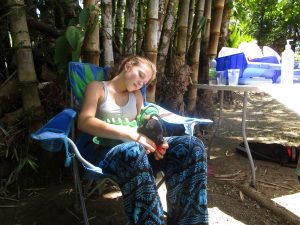
KIDS AND PUPPIES ARE A HAPPINESS SLAM DUNK
To a one, these kids were sweet, cute, innocent, free of games and hidden agendas; they were honestly expressing their genuine feelings. My four hours in an almost total-kid-world turned out to be completely delightful. It was a huge escape from the adult world of cynicism and games. The kids made it loving and wonderful. Their ability to find fun and wonder in a hair brush, a ball, and a puppy was infectious. They reminded me of when my world was young and fresh, sweet and wide-eyed. Traits that I, and all adults, still possess; often buried somewhere deep inside ourselves.
Things are harder for kids and puppies. Some don’t have their full physical strength and agility yet, and they certainly haven’t developed the mental and emotional strengths necessary for an independent life. They can’t really understand how something that could be so much fun, like jumping from rock to rock on the beach or chewing on a favorite shoe, could bring such a loud “NO!” Nor do they understand why something as boring as learning spelling words or asking to go outside before peeing, could be important. That’s our job; to see what they can’t see.
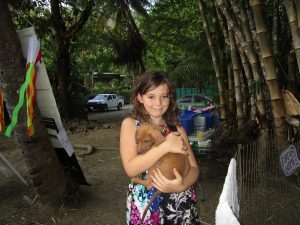
But, it’s a part of THEIR ROLE in our lives to remind us of what we can no longer see; that happiness is natural. Not natural in the sense that breathing is our moment to moment nature, but as a potential of our nature. We are wired to be able to FEEL happiness, and without that “wiring,” there would be no experience of happiness at all. We may not feel happiness continuously, but it’s often present for the asking. And kids can remind us how to summon it.
SO, WHEN DO KIDS FEEL HAPPY?
Maybe it’s better to ask when are they not happy?
Kids, like puppies, are happy beholding various aspects of their still wondrous world. They thrive on exploring the new, testing their skills and understanding, seeing what they can discover and what they’ve learned to do well. In the company of critters like themselves, small, dependent, cute, wanting nothing more than to play, and be loved, puppies give kids a chance to be the “grownups.” Demonstrating their evolving grownup skills, it was no accident that the most popular puppy activity was bathing the wriggling little ones. One especially cute pup must have gotten five baths that day.
A few adults came by and briefly watched the frolicking, but kept a hands-off distance. Some would pet the pups for a few minutes and move on. The children, meanwhile, simply dived right in, wholeheartedly absorbed in the cuddly fur balls, unconcerned about what anyone might think or what life was demanding elsewhere. Fully engaged, fully present, not distracted by cell phones or worries, unreservedly enjoying some of life’s best: Love and youth.
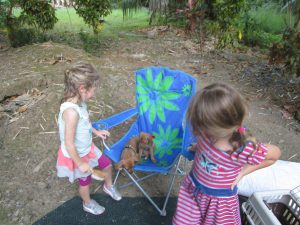
ADULT HAPPINESS: MORE COMPLICATED.
As adults we’re happy when some situation brings us pleasure, satisfaction, AND has some personal meaning. We look for some symbolic, emotional, personal, or conceptual “take” on an event to decide if it is what makes one situation feel happy while another feels “blah” or sad. Our “take” on a situation can give or take away the potential for happiness. Believe it or not, some adults seemed uncomfortable with the puppy pen. For them, the primary concern was not the joy, but the risk; “Be careful. Don’t hurt that puppy.” Their focus on some possible danger erased all joy.
This might be called the “interactive” view of happiness. We feel happy when we “see” a situation as one that meets our needs. Happiness there is the result of an interaction between a situation and our perception of it.
Many believe that happiness is possible, but only if we’re in the right conditions. In this view it’s the situation alone that “makes” us happy. We can only create happiness by putting ourselves in the right situations. This “we feel happiness—IF the conditions are right” perspective seems confirmed by our daily experiences. The weather’s great, we feel good. It’s pouring rain, we feel down.
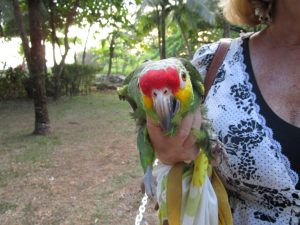
As conditions change throughout our day, the brief, intense short-term kind of happiness that comes and goes seems totally dependent on the situations. Those conditions seem completely in charge of our happy feelings. Happiness from this perspective comes from the “outside”—from the conditions.
A third view claims that happiness is not just dependent on external conditions or on our perception of those conditions, but is “always present inside us.” It’s not simply one of many emotions we are capable of feeling, but happiness is who we truly are at our core, our very nature regardless of conditions. Kids seem to confirm this perspective. Don’t bring distress into their lives to distract them from their core being, and they’re happy.
Core happiness is harder to explain and understand than interactive or conditional happiness. But kids help. They certainly feel pain, but few have learned how to reduce or eliminate their own happiness. Few feel the enduring, happiness-erasing emotions of guilt, regret, remorse, loss, resentment, anger, jealousy, and so on. They haven’t yet learned to live in the “rear view mirror” of life, looking back on a regretted past. Nor ahead to all the danger and pain that lie in wait for us.
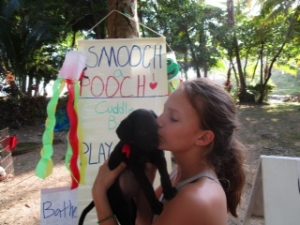
Imagine the typical adult playing with a pup. You’ll hear many “OMGs” and “oohs and ahhs” and off they go to another emotional place, returning quickly to their worries and preoccupations. From the core happiness perspective, happiness is still within them, but has been buried under adult concerns.
I almost spoiled this great opportunity for happiness by being negative about the booth I was assigned at the fund raising fair (the interactive view). I only focused on the downsides (packing the equipment, driving all the way up to…and having no one show up). I neglected to consider what Saturday mornings at the shelter always give me—some dog always happy to see me. Luckily, my sense of responsibility kicked in and the reality of the event erased my negative expectations. I almost talked myself out of one of my most happy experiences.
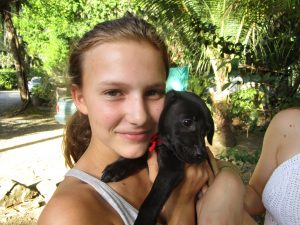
Whatever the ultimate source of happiness (interactive, conditional, or core) it rewards us for certain experiences, habits, behaviors, and ways of living (in this case, keeping my promises). In this view, happiness is built in to guide us generally toward the good. Happiness is thus a refined aspect of the pain or pleasure “GPS” that we’re born with—telling us “we want to feel more of this, then rinse and repeat the way you’ve been living.”
Wanna feel happy again in the future? Request the “Smooch a Pooch” booth at the fair.
I wasn’t just doing my part for the animal shelter fund-raiser; I was a kind of shorts and t-shirt “Santa Claus” with a bag full of happiness for those kids. I could have seen the kids as a pain in the ass because I had to keep track of them and the puppies, but I didn’t…and they weren’t. I trusted their feelings about the pups and let them play as they wished. And that interaction with them made me happy; the puppies loved being loved, the kids loved loving the pups, and I loved seeing all that love given and received. It was a very happy day!

For more real estate for this region at the WeLoveCostaRica Dominical listings page, click here
Are you into beautiful Costa Rica?
All interesting things you want to know about Costa Rica are right here in our newsletter! Enter your email and press "subscribe" button.


